Fermented Bitter Leaf as a Game-Changer Against Antibiotic-Resistant Escherichia coli and Salmonella typhi Bacteria
Nikhil Prasad Fact checked by:Thailand Medical News Team Nov 21, 2024 4 months, 3 weeks, 2 days, 17 hours, 30 minutes ago
Herbs And Phytochemicals: A groundbreaking study has uncovered the potent antibiotic properties of fermented Vernonia amygdalina, commonly known as bitter leaf. Researchers from the Department of Biochemistry and Medical Laboratory Sciences at Redeemer’s University, Ede, Osun State, Nigeria, have demonstrated how fermentation significantly enhances the medicinal properties of this plant. This
Herbs and Phytochemicals news report explores how this traditional plant may offer solutions to the global health threat posed by multidrug-resistant (MDR) bacteria.
 Fermented Bitter Leaf as a Game-Changer Against Antibiotic-Resistant Escherichia coli
Fermented Bitter Leaf as a Game-Changer Against Antibiotic-Resistant Escherichia coli
and Salmonella typhi Bacteria
Antibiotic Resistance Crisis and the Role of Bitter Leaf
Antibiotic resistance is a mounting problem worldwide, with millions succumbing to drug-resistant infections each year. In Nigeria and other parts of sub-Saharan Africa, the death rate from such infections remains alarmingly high. Traditional remedies like bitter leaf have long been used for treating ailments, but their full potential had not been fully harnessed - until now.
This study reveals how fermentation, a natural process, transforms the chemical composition of bitter leaf, making it a potent weapon against multidrug-resistant strains of Escherichia coli and Salmonella typhi. The study highlights how the fermentation process boosts the leaf's bioactive compounds, giving it enhanced antioxidant, anti-inflammatory, and antibacterial properties.
How Fermentation Unlocks Medicinal Potential
The team of scientists, led by Atunnise Adeleke Kazeem and his colleagues, found that the fermentation of Vernonia amygdalina over 10 days resulted in significant changes in its phytochemical profile. The process increased the concentration of beneficial compounds like lycopene, flavonoids, and carotenoids while reducing others like chlorophyll and phenols.
Key findings include:
-Enhanced Antioxidant Properties: The fermented leaf extract demonstrated improved ability to neutralize free radicals and protect against oxidative damage.
-Anti-Inflammatory Effects: The fermented extracts showed greater effectiveness in reducing inflammation compared to unfermented samples.
-Antibiotic Activity: Fermentation improved the extract's ability to inhibit the growth of multidrug-resistant E. coli and S. typhi. A particularly promising compound, 4,6-Cholestadien-3β-ol, was identified as a major contributor to this antibacterial activity.
The Science Behind the Discovery
Using advanced techniques like gas chromatography-mass spectrometry (GC-MS) and Fourier-transform infrared spectroscopy (FTIR), researchers analyzed the chemical changes in the plant during fermentation. On day nine of the pr
ocess, the compound 4,6-Cholestadien-3β-ol emerged as a star performer. This steroid-like molecule demonstrated higher binding affinity to bacterial target proteins than standard antibiotics like ampicillin.
Laboratory tests revealed that this compound effectively disrupted the bacterial cell membranes and inactivated key enzymes needed for bacterial survival. The study also employed in-silico analysis, which showed that the compound formed multiple non-ionic interactions, a critical factor in its broad-spectrum antibiotic action.
Potential Applications
The fermented bitter leaf extract offers several exciting possibilities:
-Treatment of MDR Infections: With its broad-spectrum activity, the extract could become a natural alternative to conventional antibiotics.
-Functional Food Ingredient: Given its antioxidant and anti-inflammatory benefits, the fermented extract might be incorporated into health supplements or functional foods.
-Eco-Friendly Medicine: Fermentation is a sustainable, environmentally friendly process that could pave the way for green drug development.
Conclusion: A New Hope for Antibiotic Development
The discovery of the antimicrobial potential of fermented Vernonia amygdalina is a significant step in the fight against antibiotic resistance. The study not only highlights the transformative power of fermentation but also underscores the importance of exploring traditional remedies in modern medicine. As global health systems grapple with the threat of superbugs, natural solutions like this offer a glimmer of hope.
The study findings were published in the peer-reviewed journal: In Silico Pharmacology (Springer).
https://link.springer.com/article/10.1007/s40203-024-00277-2
For the latest on
Herbs And Phytochemicals, keep on logging to Thailand Medical News.
Read Also:
https://www.thailandmedical.news/news/uk-reports-66730-antibiotic-resistant-infections-in-2023-2024-set-to-break-even-more-alarming-records
https://www.thailandmedical.news/news/thailand-medical-researchers-discover-peptide-from-scorpion-venom-to-treat-drug-resistant-pseudomonas-biofilm-infections
https://www.thailandmedical.news/news/study-shows-that-disinfectants-containing-benzalkonium-chloride-can-give-rise-to-drug-resistant-microbes
